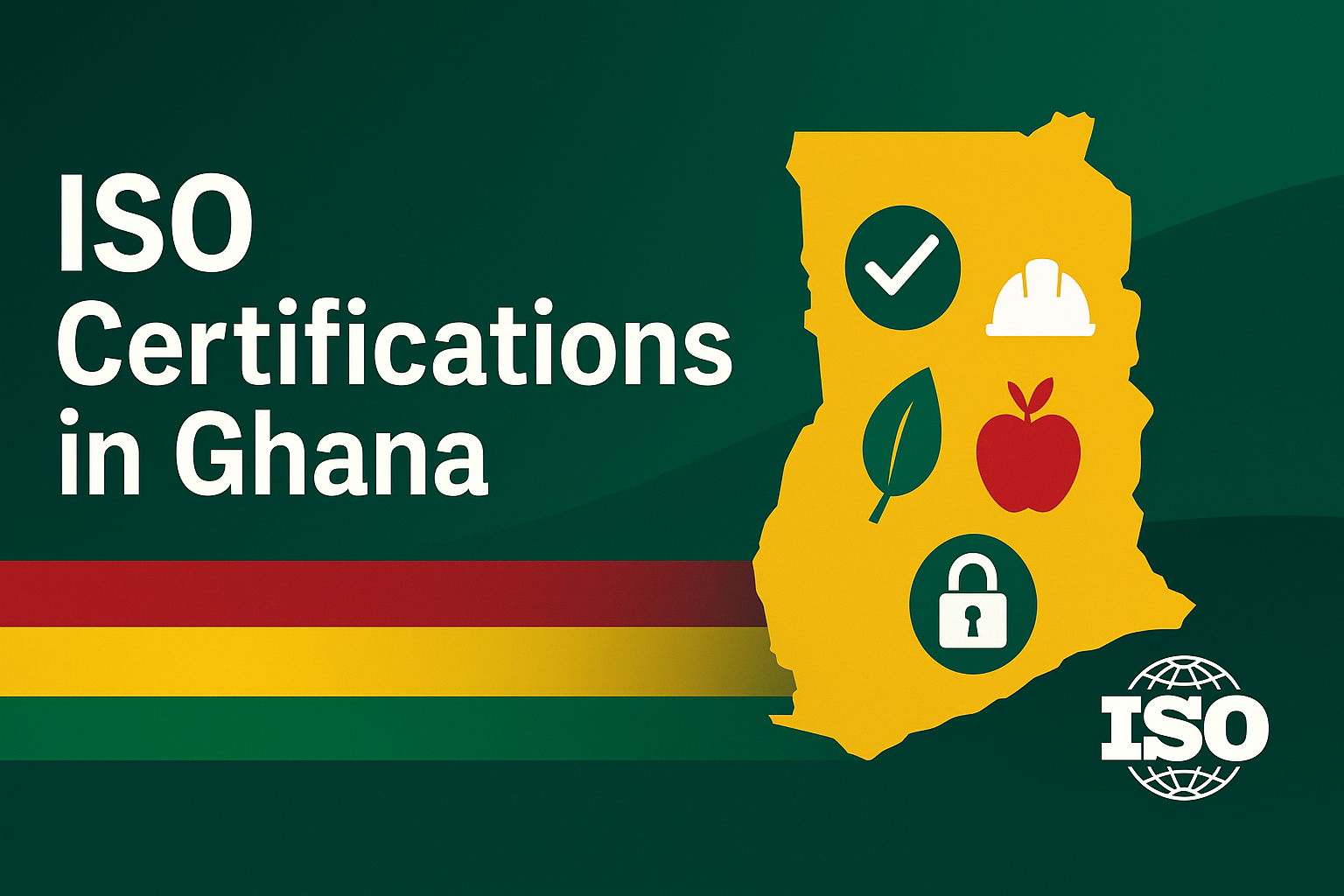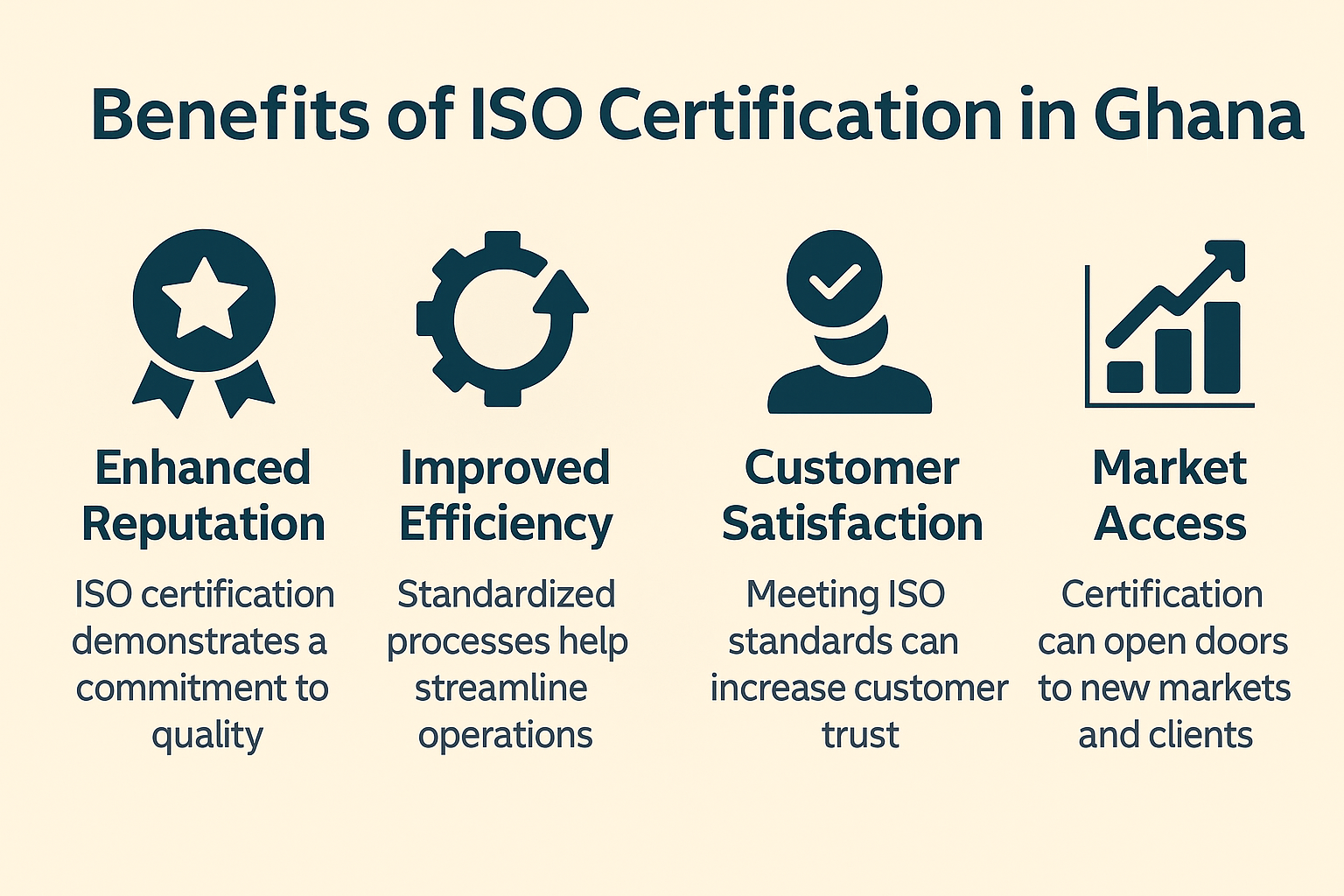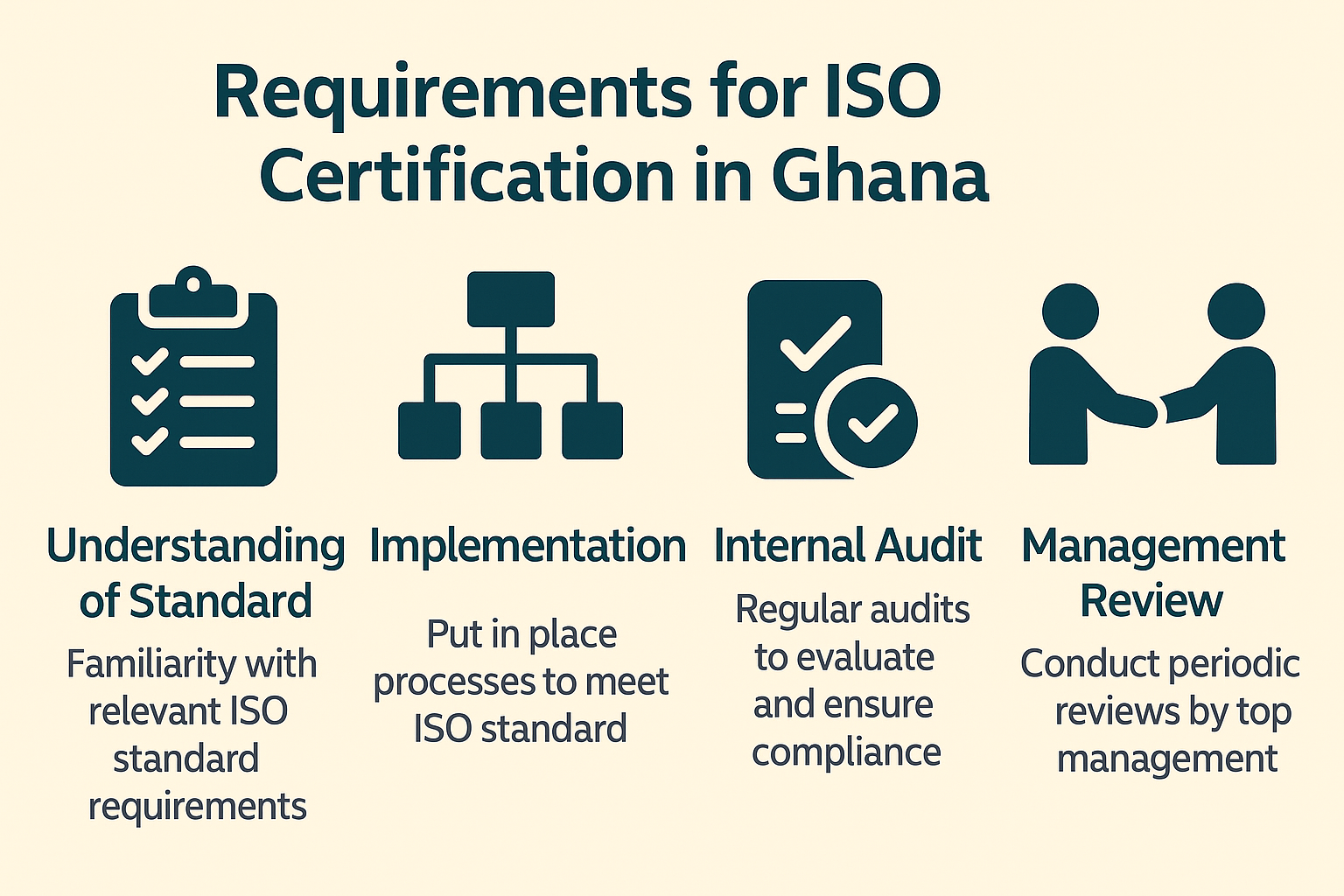ISO Certifications in Ghana – Trusted Standards for Business Growth

ISO certification is quickly becoming a strategic requirement for Ghanaian companies that want to compete locally and export confidently to the ECOWAS region and beyond. From cocoa processing to offshore oil, businesses across Ghana are turning to internationally recognized ISO standards to prove quality, safety, and sustainability while meeting Ghana Standards Authority (GSA) conformity requirements.
WHY ISO CERTIFICATIONS MATTER IN GHANA
Ghana’s economy is diversifying beyond gold and cocoa into oil & gas, digital services, and advanced manufacturing. ISO certification helps firms:
- Win public and private tenders that specify ISO clauses.
- Access continental and EU markets by meeting AfCFTA and EU due-diligence expectations.
- Reduce regulatory friction by demonstrating proactive compliance with GSA quality and safety mandates.
KEY ISO STANDARDS ADOPTED IN GHANA
- ISO 9001:2015 – Quality Management (manufacturing, construction)
- ISO 45001:2018 – Occupational Health & Safety (mining, oil & gas)
- ISO 22000:2018 – Food Safety Management (agribusiness, cocoa)
- ISO 14001:2015 – Environmental Management (utilities, extractives)
- ISO 27001:2022 – Information Security (ICT, fintech)
- ISO 50001:2018 – Energy Management (manufacturing, facilities)
BENEFITS FOR GHANAIAN BUSINESSES
- Improved operational efficiency and reduced rework
- Enhanced credibility with customers, banks, and investors
- Easier market access to ECOWAS and EU buyers
- Stronger stakeholder confidence supporting ESG and SDG goals

REGULATORY & ACCREDITATION LANDSCAPE
- The Ghana Standards Authority (GSA) runs a Management System Certification Department accredited for ISO 9001 and other schemes.
- GSA recognizes certificates issued by impartial bodies such as Pacific Certifications.
- Certain export programs (e.g., COCOBOD) require both ISO compliance and GSA product-mark licensing.
- Pacific Certifications’ certificates are searchable on the IAF CertSearch database, giving worldwide validation.
ISO CERTIFICATION PROCESS IN GHANA
- Gap analysis and planning
- Training and documentation development
- Internal audit and management review
- Stage 1 audit (readiness)
- Stage 2 audit (on-site verification)
- Certification decision (three-year certificate)
- Annual surveillance audits
REQUIREMENTS FOR CERTIFICATION
- Top-management commitment and a written policy
- Legal and regulatory register covering GSA, EPA, and sector laws
- Risk and opportunity analysis (e.g., HACCP, HIRA)
- Documented procedures and objective evidence (records)
- Competent internal auditors

HOW PACIFIC CERTIFICATIONS CAN HELP
- End-to-end support – gap analysis, templates, and pre-audit coaching
- Local auditors – reduced travel costs and cultural fit
- Multi-site efficiency – integrated audits for branches in Accra, Takoradi, and Kumasi
- Training portfolio – on-site and virtual Lead Auditor courses
CONCLUSION
ISO certification equips Ghanaian businesses—large and small—with a globally trusted framework to boost quality, safety, and sustainability while satisfying both the GSA and international buyers. Partnering with an accredited body like Pacific Certifications streamlines the journey from gap analysis to certification, helping Ghanaian enterprises unlock new markets with confidence.
Need guidance on the next step? Contact the Pacific Certifications Ghana team at info@pacificcert.com to schedule a free readiness call.
ISO Certifications in Ghana – Trusted Standards for Business Growth

ISO certification is quickly becoming a strategic requirement for Ghanaian companies that want to compete locally and export confidently to the ECOWAS region and beyond. From cocoa processing to offshore oil, businesses across Ghana are turning to internationally recognized ISO standards to prove quality, safety, and sustainability while meeting Ghana Standards Authority (GSA) conformity requirements.
WHY ISO CERTIFICATIONS MATTER IN GHANA
Ghana’s economy is diversifying beyond gold and cocoa into oil & gas, digital services, and advanced manufacturing. ISO certification helps firms:
- Win public and private tenders that specify ISO clauses.
- Access continental and EU markets by meeting AfCFTA and EU due-diligence expectations.
- Reduce regulatory friction by demonstrating proactive compliance with GSA quality and safety mandates.
KEY ISO STANDARDS ADOPTED IN GHANA
- ISO 9001:2015 – Quality Management (manufacturing, construction)
- ISO 45001:2018 – Occupational Health & Safety (mining, oil & gas)
- ISO 22000:2018 – Food Safety Management (agribusiness, cocoa)
- ISO 14001:2015 – Environmental Management (utilities, extractives)
- ISO 27001:2022 – Information Security (ICT, fintech)
- ISO 50001:2018 – Energy Management (manufacturing, facilities)
BENEFITS FOR GHANAIAN BUSINESSES
- Improved operational efficiency and reduced rework
- Enhanced credibility with customers, banks, and investors
- Easier market access to ECOWAS and EU buyers
- Stronger stakeholder confidence supporting ESG and SDG goals

REGULATORY & ACCREDITATION LANDSCAPE
- The Ghana Standards Authority (GSA) runs a Management System Certification Department accredited for ISO 9001 and other schemes.
- GSA recognizes certificates issued by impartial bodies such as Pacific Certifications.
- Certain export programs (e.g., COCOBOD) require both ISO compliance and GSA product-mark licensing.
- Pacific Certifications’ certificates are searchable on the IAF CertSearch database, giving worldwide validation.
ISO CERTIFICATION PROCESS IN GHANA
- Gap analysis and planning
- Training and documentation development
- Internal audit and management review
- Stage 1 audit (readiness)
- Stage 2 audit (on-site verification)
- Certification decision (three-year certificate)
- Annual surveillance audits
HOW PACIFIC CERTIFICATIONS CAN HELP
- End-to-end support – gap analysis, templates, and pre-audit coaching
- Local auditors – reduced travel costs and cultural fit
- Multi-site efficiency – integrated audits for branches in Accra, Takoradi, and Kumasi
- Training portfolio – on-site and virtual Lead Auditor courses
CONCLUSION
ISO certification equips Ghanaian businesses—large and small—with a globally trusted framework to boost quality, safety, and sustainability while satisfying both the GSA and international buyers. Partnering with an accredited body like Pacific Certifications streamlines the journey from gap analysis to certification, helping Ghanaian enterprises unlock new markets with confidence.
Need guidance on the next step? Contact the Pacific Certifications Ghana team at info@pacificcert.com to schedule a free readiness call.
FAQs
What is the most demanded ISO certification in Ghana?
ISO 9001 remains the baseline requirement across manufacturing, construction, and public procurement.
Does the GSA issue ISO certificates directly?
Yes, but organizations may also use any IAF-recognized body such as Pacific Certifications for broader acceptance.
How long is an ISO certificate valid?
Three years, with annual surveillance audits and a recertification audit in year three.
Can SMEs afford ISO certification?
Yes. SMEs can adopt a documentation-light approach and phase audits to spread costs.
Why should Ghanaian companies choose Pacific Certifications as their ISO certification body?
Pacific Certifications delivers IAF-recognized certificates through Ghana-based auditors, giving you instant global credibility with minimal hassle.
Ready to get ISO certified?
Contact Pacific Certifications to begin your certification journey today!
Suggested Certifications –






